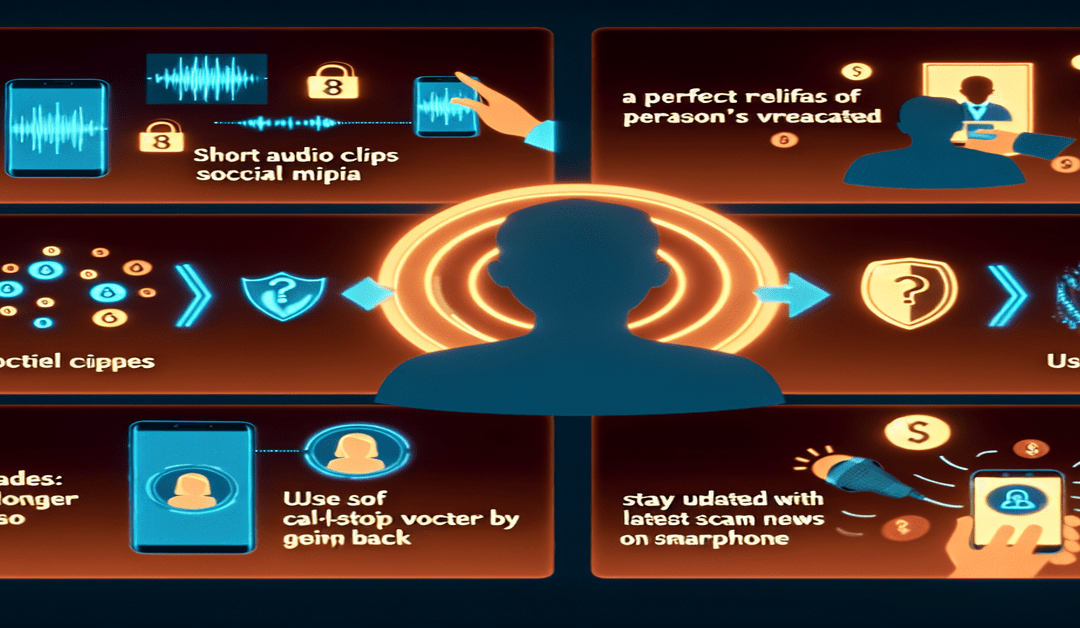The Rise of AI Voice Cloning Scams: Protecting Your Family from Deception
In the ever-evolving landscape of technology, scammers are constantly finding new ways to exploit unsuspecting victims. One of the latest and most concerning trends is the rise of AI voice cloning scams targeting families. These scams leverage advanced artificial intelligence to create eerily accurate replicas of loved ones’ voices, deceiving victims into sending money or revealing sensitive information. As an industry expert, I want to shed light on this alarming issue and provide you with essential information to safeguard your family from these malicious attacks.
How AI Voice Cloning Scams Operate
Scammers are harnessing the power of voice cloning technology to create highly convincing impersonations of family members, friends, or even business associates. By utilizing AI algorithms, they can generate almost perfect replicas of a person’s voice from just a short audio clip, often sourced from social media or other online platforms[1][3]. This level of sophistication makes it increasingly difficult for the average person to distinguish between a real call and a fraudulent one.
Once the scammers have successfully cloned a voice, they employ various scam tactics to manipulate their victims. A common approach is to claim that a family member is in distress or facing an emergency situation, urging the victim to provide immediate financial assistance[2][3]. The scammers may spin elaborate stories, such as a loved one being involved in an accident, facing legal troubles, or requiring urgent medical attention. The convincing nature of the cloned voice adds a layer of credibility to these fabricated scenarios, making it easier for scammers to exploit the emotional vulnerability of their targets.
Protecting Yourself and Your Family
In light of these alarming developments, it is crucial to take proactive measures to protect yourself and your loved ones from falling victim to AI voice cloning scams. Here are some essential steps you can take:
1. Verify Calls: If you receive a suspicious call claiming that a family member is in trouble, take a moment to verify the situation independently. Contact the person in question directly through a trusted means of communication to confirm their whereabouts and well-being before taking any action[5].
2. Be Cautious with Information: Never provide personal or financial information over the phone unless you are absolutely certain of the caller’s identity. Scammers may attempt to extract sensitive details, such as Social Security numbers, bank account information, or credit card details, under the guise of urgency[5].
3. Use Secret Codes: Consider establishing secret code words or phrases with your family members to verify each other’s identities during unexpected or suspicious calls. This added layer of security can help you quickly determine whether the caller is genuine or a scammer[3].
4. Utilize Technology: Take advantage of call-blocking tools and apps available on your smartphone or through your service provider. These tools can help filter out potential scam calls and reduce the chances of falling victim to voice cloning scams[5].
5. Stay Informed: Keep yourself updated on the latest scam tactics and trends. Regularly educate your family members about the risks of voice cloning scams and the importance of vigilance. If you do encounter a suspicious call, report it to the appropriate authorities to help prevent others from falling victim[5].
The Future of Voice Cloning Scams
As AI technology continues to advance at a rapid pace, it is likely that voice cloning scams will become even more sophisticated and difficult to detect. Scammers may find new ways to exploit this technology, potentially expanding their targets beyond just families. It is essential for individuals, businesses, and government agencies to stay vigilant and proactive in combating these emerging threats.
Collaborative efforts between technology companies, law enforcement, and cybersecurity experts will be crucial in developing effective countermeasures against AI voice cloning scams. This may involve the creation of advanced detection algorithms, the implementation of more robust security protocols, and the promotion of public awareness campaigns to educate people about the risks and prevention strategies.
Conclusion
AI voice cloning scams represent a disturbing trend that poses a significant threat to the security and well-being of families worldwide. By understanding how these scams operate and taking proactive measures to protect ourselves, we can reduce the risk of falling victim to these malicious attacks. It is crucial to remain vigilant, stay informed, and prioritize the safety of our loved ones in the face of this evolving threat.
Remember, if you ever find yourself in doubt about the authenticity of a call, trust your instincts and take the necessary steps to verify the situation independently. By working together and staying one step ahead of the scammers, we can create a safer digital environment for ourselves and our families.
#VoiceCloningScams #FamilyProtection #CyberSecurity
-> Original article and inspiration provided by ReviewAgent.ai
-> Connect with one of our AI Strategists today at ReviewAgent.ai

